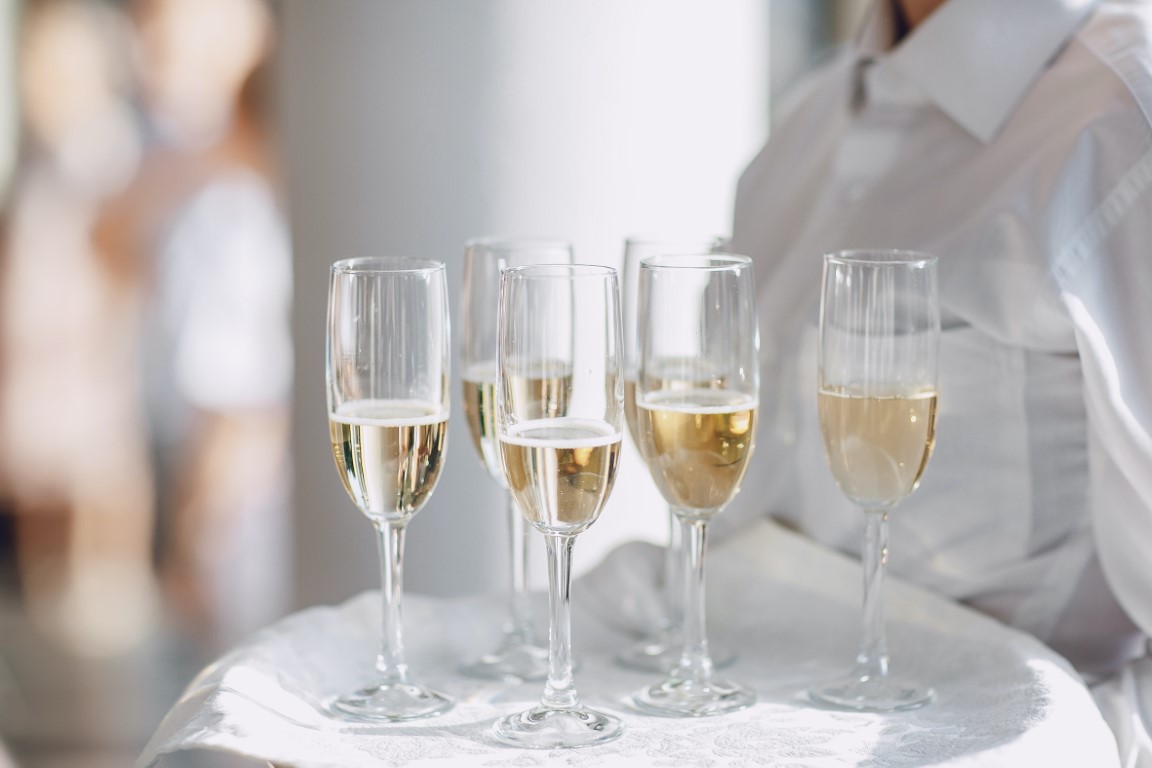At no other time of year is champagne more popular than around the end-of-year holidays. Of the top ten most popular holidays to consume alcohol, four of them fall between October and January (Halloween, Thanksgiving, Christmas and New Year's Eve). Of holiday drinks, champagne is one of the most popular because its carbonation gives it an air of festivity and the "pop" of cork from bottle is a signature expression of a celebration's kickoff.
Champagne is technically exclusively crafted in the Champagne region of France. However, the word "champagne" is often used to refer to any sparkling wine. It doesn't matter to your teeth if you're drinking proper champagne or not. The damage this festive drink can do to your oral health is astounding! Here at the Upper Hunt Club Dental Centre in Ottawa we'd like to inform you of those dental risks so you can consider beverage alternatives this holiday season.
The Risks of Champagne to Your Oral Health
Champagne is carbonated wine and as such can be damaging to your oral health much like carbonated soda. That's because champagne serves up a trifecta of dental-damaging components: Sugar, Carbonation and Alcohol.
Sugar Content
Sugar is food for damaging oral bacteria, and champagne can contain up to the equivalent of five teaspoons of sugar per glass depending on the variety, so you can imagine the happy dance oral bacteria are doing every time you sip on one (or more) glasses of bubbly over the course of multiple celebrations.
Carbonation
Carbonation, even natural carbonation, eats away at enamel. The addition of that delightful fizz also increases the beverage's acidity, making the drink harder on your teeth.
Alcohol
Where carbonated sodas have added (citric) acid for flavouring, sparkling wines have alcohol. Alcohol is just another kind of sugar. So, it's comparable to adding more sugar to your already sugary soda, which is not good. Alcohol also dehydrates you, leading to a decrease in saliva flow which causes bacteria to cling to enamel and increase the risk of tooth decay.
Healthier Champagne Alternatives
Perrier, La Croix or other unsweetened "bubbly" drinks are great festive alternatives to champagne. Flavoured or not, lack of sweeteners automatically makes carbonated water a better option! Even opting for a non-sparkling wine (preferably a dry red; those have less sugar) is a better bet. Best of the best options, consider drinking seltzer water with a garnish of lemon or other fruit. Though the carbonation in the water will still cause some enamel erosion, aside from flat, plain water, seltzer is the least damaging to your dental health.
Final Notes on Celebrating This Season
If, despite the points in this article, you decide to pop the cork on a bottle of bubbly anyway, at least consider following these three guidelines:
1. Don't Sip Throughout the Celebration
The only thing worse than damaging your teeth with champagne this season would be to sip on it throughout the course of the day. Or evening. Or multiple celebratory evenings. Sipping champagne slowly continuously exposes your gums and teeth to the harmful effects of sugar, carbonation and alcohol. Instead, consider drinking a glass in a moderate timeframe and switching to water or stopping to eat some food, both of which help to neutralize the pH in your mouth and allow time for your saliva to naturally flush away the sugars and protect your teeth and gums from decay.
2. Pack Some Gum
If you can sneak away from the party to brush your teeth about a half hour after enjoying a glass of champagne, do so! However, we understand that's not a very realistic endeavour for everyone, so we suggest you chew on sugarless gum in between glasses. Gum stimulates the salivary glands and helps wash away acids and sugars that do dental damage. Plus, then your breath will be minty fresh throughout the celebration.
3. Hydrate, Hydrate, Hydrate
Finally, no matter how you eat and drink, please remember to continue to hydrate with plain water as much as possible. It's easy to forget about water when there's so much to celebrate, but your mouth and the Upper Hunt Club Dental Centre in Ottawa will continue to thank you for it long after the party is over.
2020 has taught us the importance of our loved ones and appreciating every moment we have. Start the new year off with good oral health by being mindful of what you consume this holiday season. Contact us today to schedule an appointment for the new year to begin your 2021 on a healthy note. The Upper Hunt Club Dental Centre in Ottawa wishes everyone a happy and safe holiday season. We look forward to seeing you in the new year.













